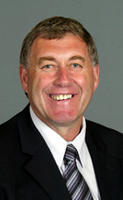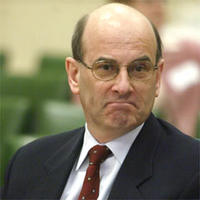Emperor Duceppe's Grand Army
 Gilles Duceppe is apparently reeeeeeaaaally keen on getting Quebec its own armed forces:
Gilles Duceppe is apparently reeeeeeaaaally keen on getting Quebec its own armed forces:Bloc delegates are gathered in Montreal to draft policy for a Quebec independent of Canada, including proposals for an army, a free trade deal with Europe and Mexico, an immigration policy and diplomatic ties with Washington.
"It doesn't mean that you're going to war because you have an army," said Duceppe, who faces a leadership review during the three-day policy convention.
Duceppe said the Bloc, which holds 54 of the province's 75 seats in Parliament, envisioned a "small army," like that of Denmark or Norway.
He said it would be deployed for natural disasters, international peacekeeping missions and - only if necessary - to armed conflicts.
"Anyway, what equipment do we need?" Duceppe said. "Do we need nuclear submarines? We say no. Maybe multifunctional boats to transport troops, equipment, and to transform into hospitals across Haiti."
In this statement, you can see both the strengths and weaknesses of Duceppe's thinking on Quebec's security needs.
Let's be candid for a moment. If you don't believe in the idea of Quebec independence, then Duceppe's idea is ludicrous. But if you are capable of envisioning Quebec as an independent nation state, then the notion is worthy of public discussion. Because if Quebec has to rely on Canada to defend its military interests, then the notion of true independence is exposed as a farce.
And Quebec does have military interests. Montreal and Quebec are major commercial ports that can be disrupted by terrorist attacks. There are hydroelectric projects in the northern region that are vulnerable to air attack. An independent Quebec has to figure out some way of protecting its assets in the event that Canada refuses to do it for them. And it can't be done by merely assigning more taskings to the Sureté du Québec -- the provincial police simply don't have the training for such operations, nor would such training be easy to obtain.
So Duceppe is only being a responsible politician when he insists on putting defence on the table. His examples, though, simply prove that he's not as deep-thinking as he would like Quebeckers to believe.
Haiti is an example of a UN peacekeeping operation, and Duceppe seems to be suggesting that the province would be fielding a UN peacekeeping battalion. He seems to be relying on the traditional support that Canadians give their military when it comes to peacekeeping operations.
Unfortunately, it's also a weak selling point. Peacekeeping depends on a lot of things: the goodwill of the host country, the direction of the UN, and the resources that an independent Quebec would be willing to invest. None of these factors can be relied upon at the moment.
Our estwhile Emperor is also somewhat shallow in his thinking when it comes to recruiting for his proposed Grand Army:
Duceppe said he had faith a Quebec army would have no trouble recruiting.
"When you look at voting (for separatist parties) . . . we have very good results among the military," he said. "There are lots of sovereigntists in the Canadian army," he said.
"Mr. Duceppe is displaying his total ignorance," Transport Minister Jean Lapierre said in a telephone interview with he Canadian Press.
"He just has to look at the voting results of soldiers and he'll see that the army hasn't become sovereigntist at all. These people are committed to defending Canada," he said.
Frankly, I don't think either of those two have done much thinking about voting records in the Canadian military. If Elections Canada keeps those sorts of statistics, they're not available to the public, at least not online.
Could Emperor Gilles recruit an army? Certainly; he might be able to attract former members or reservists who don't want to leave the province. But he's hampered by one simple fact: good defence costs money. The provincial government has a very heavy debt load which puts the kibosh on most new program spending. Gilles Duceppe won't get his army -- because right now Quebec can't afford it.
Of course, he could try to cut a deal with the cloners on Kamino ...























